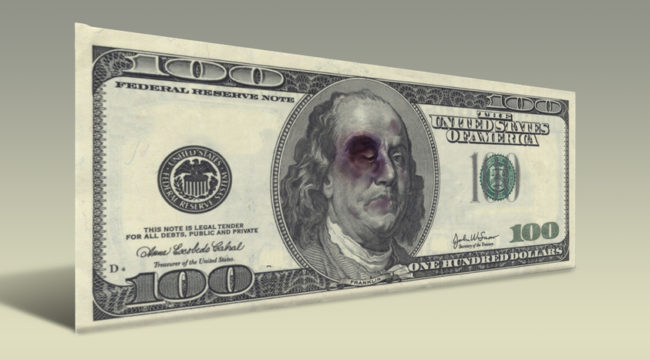Debt-Based Money Corrodes Society
We open today’s reckoning with a hypothesis:
The current monetary system debauches the culture.
Long-suffering readers are familiar with our… diminished regard for paper money.
Paper money — or digital money nowadays — is the great bogeyman of the boom/bust cycle. It inflates bubbles of every model and make.
Meanwhile, paper money fuels big government… as oxygen fuels fire.
But paper money’s effects on the culture?
“It has a very important impact on our culture,” writes economist Jorg Guido Hulsmann.
Under “natural money” like gold Hulsmann explains, prices tend to fall over time.
So natural money encourages the virtues of saving… thrift… deferred gratification. It sets the mind to the future:
In a free economy with a natural monetary system, there is a strong incentive to save money… Investments in savings accounts or other relatively safe investments also play a certain role, but cash hoarding is paramount.
Before the 20th century, explains Hulsmann, debt was a cultural taboo… a big scarlet “D.”
Credit for households was virtually unknown, he says. And only the poorest households resorted to debt-financed consumption.
Ah, but then the 20th century came along with its wars… its social movements… and its cranks…
Gold is a famously uncooperative agent of change.
It resists social uplift, in the same way an old man resists a new pair of shoes.
It turns away from the sound of trumpets.
“You go over there,” gold says. “I’m staying here.”
“The trouble with gold is that it turns its back on world improvers, empire builders and do-gooders,” wrote Bill Bonner and our leader Addison Wiggin in Empire of Debt.
“The nice thing about gold is that it is so unresponsive,” they continued. “It neither laughs nor applauds.”
And that’s why it couldn’t last…
Only a debt-backed system of paper money could finance the great wars, the social improvements and the fevered dreams of the 20th century.
But the same debt-based money also seeped its way into the cultural marrows… got into the bloodstream… and went to work…
The slow grind of saving yielded to lure of the fast buck. Hulsmann says it all encouraged a short-term perspective.
“Fiat-money systems tend to make people insatiable in their quest for ever higher monetary returns on their investments,” Hulsmann notes.
Hurry, hurry, hurry. More, more, more.
Hulsmann argues things work differently under a natural monetary system.
As savings increase under such a system, the return on investments of all sorts tends to diminish.
And instead of chasing rainbows, people direct their monies in pursuit of other worthwhile interests, including philanthropy:
It becomes ever less interesting to invest one’s savings in order to earn a return, and thus other motivations shift into the foreground. Savings will be used increasingly to finance personal projects including the acquisition of durable consumers’ goods, but also philanthropic activity. This is exactly what we saw in the West during the nineteenth century.
“By contrast,” Hulsmann adds,”in a fiat money society you are more likely to increase your returns by remaining in debt and continuing to chase monetary revenue indefinitely by leveraging more and more funds.”
The debt-soaked society loses something of the human face perhaps. He concludes:
You can imagine, then, how this inflation and debt-based system, over time, will begin to change the culture of a society and its behavior.
We become more materialistic than under a natural monetary system. We can’t just sit on our savings anymore, and we have to watch our investments constantly, and think about revenue constantly, because if it is not earning enough, we are actively getting poorer.
A point to ponder of a June day…
We don’t argue of course that a restoration of sound money would turn every heart to gold.
But it seems this Hulsmann has hooked onto something here.
Maybe our paper money system has not only debased our economy and our politics… but also our culture.
And maybe our socially inclined money… has somehow made us less social…
Regards,
Brian Maher
Managing Editor, The Daily Reckoning



Comments: